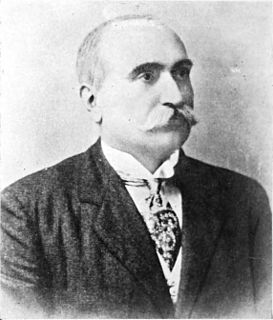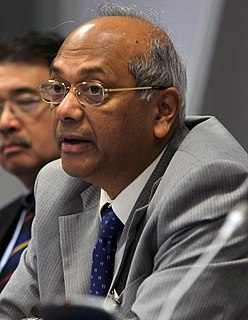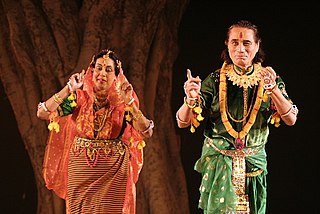See also
| This disambiguation page lists articles about people with the same name. If an internal link led you here, you may wish to change the link to point directly to the intended article. |
Homi Bhabha may refer to:
| This disambiguation page lists articles about people with the same name. If an internal link led you here, you may wish to change the link to point directly to the intended article. |
Smiling Buddha was the assigned code name of India's first successful nuclear bomb test on 18 May 1974. The bomb was detonated on the army base, Pokhran Test Range (PTR), in Rajasthan by the Indian Army under the supervision of several key Indian generals.

Raja Ramanna was an Indian physicist who is best known for his role in India's nuclear program during its early stages.
Mambillikalathil Govind Kumar Menon, FRS, also known as M. G. K. Menon, was a physicist and policy maker from India. He had a prominent role in the development of science and technology in India over four decades. One of his most important contributions was nurturing the Tata Institute of Fundamental Research, Mumbai, which his mentor Homi J. Bhabha founded in 1945.

The Homi Bhabha National Institute (HBNI) is an Indian deemed university established by the Department of Atomic Energy, which unifies several of their constituent institutions. Deemed universities in India have been divided in three categories by the Ministry of Human Resource Development (MHRD) and HBNI has been placed in category 'A', highest of the three categories.

Pandit Satyasheel Deshpande is a Hindustani classical musician who specialises in singing Khayal. He is a disciple of Pandit Kumar Gandharva and the son of musicologist Vamanrao Deshpande.

Sir Dorabji Tata was an Indian businessman, and a key figure in the history and development of the Tata Group. He was knighted in 1910 for his contributions to industry in British India.

Dr. Srikumar Banerjee is an Indian metallurgical engineer. He is a physical metallurgist who made contributions to the study of phase transformations in zirconium and titanium based alloys.
Bhabha may refer to:

Homi Bhabha Centre for Science Education (HBCSE) is a National Centre of the Tata Institute of Fundamental Research (TIFR), Mumbai, India. The broad goals of the institute are to promote equity and excellence in science and mathematics education from primary school to undergraduate college level, and encourage the growth of scientific literacy in the country. To these ends it carries out a wide spectrum of inter-related activities, which may be viewed under three broad categories:

Rajkumar Singhajit Singh, is a leading exponent, choreographer and a guru of Indian classical dance form of Manipuri, including the Pung cholom and Raslila. He was awarded the Sangeet Natak Akademi Award in 1984 and the Padma Shri in 1986 for his contribution to the Manipuri dance. In the year 2011, Sangeet Natak Akademi, India's The National Academy for Music, Dance and Drama, awarded him with its highest award, the Sangeet Natak Akademi Fellowship for his contribution to Indian Dance.

Nagarjuna G. works in the Homi Bhabha Centre for Science Education, Tata Institute of Fundamental Research in Mumbai, India. His major research interests include Science Education, Cognitive Science, History and Philosophy of Science and Structure and Dynamics of Knowledge. As an activist he focuses on promoting free knowledge and free software and serves as the chairperson of Free Software Foundation of India.

Malur Ramasamy Srinivasan, is an Indian nuclear scientist and mechanical engineer. He played a key role in the development of India's nuclear power programme and the development of the PHWR. He received the Padma Vibhushan Award.
Jyeshtharaj Bhalchandra Joshi is an Indian chemical engineer, nuclear scientist, consultant and teacher, widely known for his innovations in nuclear reactor designs and generally regarded as a respected teacher. He is the DAE-Homi Bhabha Chair Professor, Homi Bhabha National Institute, Mumbai, and is the recipient of Shantiswarup Bhatnagar Prize for Engineering Sciences and many other awards and recognitions. He received the third highest civilian honour, the Padma Bhushan, in 2014 for his services to the field of chemical engineering and nuclear science.
Badanaval Venkatasubba Sreekantan is an Indian high-energy astrophysicist and a former associate of Homi J. Bhabha at the Tata Institute of Fundamental Research (TIFR). He is also a Dr. S. Radhakrishnan Visiting Professor at the National Institute of Advanced Studies, Bangalore. Known for his studies in the fields of cosmic rays, elementary particles, and high-energy X-ray astronomics, Sreekantan is an elected fellow of all the three major Indian science academies namely, the Indian Academy of Sciences, the Indian National Science Academy and the National Academy of Sciences, India as well as the Maharashtra Academy of Sciences. He was also an associate of Bruno Rossi at Massachusetts Institute of Technology. The Government of India awarded him the Padma Bhushan, India's third highest civilian honour, in 1988.
Bhabha is a surname. Notable people with the surname include:
Bhalchandra Madhav Udgaonkar is an Indian theoretical particle physicist, scientist, educationist and the co-editor of A Nuclear-Weapon-Free World: Desirable?, Feasible?. His contributions have been reported in the development of Homi Bhabha Centre for Science Education (HBCSE), Institute of Physics, Bhubaneswar and Marathi Vidnyan Parishad (MaViPa). An alumnus of the Raja Shivaji Vidyalaya, he is a member of the Institute of Advanced Study, USA, a scientists' community, and a former president of the Marathi Vidnyan Parishad. He is the author of several books and has contributed content to books written by others. The Government of India awarded him the third highest civilian honour of the Padma Bhushan, in 1985, for his contributions to science and technology.

Dipankar Chatterji is an Indian molecular biologist and the Honorary Professor at Molecular Biophysics Unit, Indian Institute of Science, a multidisciplinary research institute under the Department of Science and Technology of the Government of India. He is known for his pioneering research on bacterial transcription. He is a recipient of Shanti Swarup Bhatnagar Prize and is an elected fellow of all the major Indian science academies. The Government of India awarded him the fourth highest civilian honour of the Padma Shri, in 2016, for his contributions to science and engineering.
Ramakrishnan Nagaraj is an Indian biochemist, molecular biologist and the leader of a team of scientists working in the field of peptide biochemistry at Centre for Cellular and Molecular Biology (CCMB). He is known for his studies on hemolytic and antibacterial properties in synthetic analogs of bacterial toxins. He is a J. C. Bose National fellow of the Department of Science and Technology at CCMB and an elected fellow of the Indian Academy of Sciences, National Academy of Sciences, India and the Indian National Science Academy. The Council of Scientific and Industrial Research, the apex agency of the Government of India for scientific research, awarded him the Shanti Swarup Bhatnagar Prize for Science and Technology, one of the highest Indian science awards, in 1994, for his contributions to biological sciences.